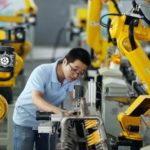 I’ve written a number of times about the interface between investments in technologies, such as AI and robotics, and employment, with most data to date suggesting that the fears that such technologies will result in wholesale unemployment are untrue. Indeed, most studies find that investing in technology allows firms to be more productive and employ more people.
I’ve written a number of times about the interface between investments in technologies, such as AI and robotics, and employment, with most data to date suggesting that the fears that such technologies will result in wholesale unemployment are untrue. Indeed, most studies find that investing in technology allows firms to be more productive and employ more people.
What is clear, however, is that such investments are not without impact at all, and there is a definite change in the skills mix in such organizations, with lower-skilled roles typically replaced with higher-skilled ones. As such, it seems a reasonable assumption to make that less-educated workers will be more vulnerable to automation, while the new roles that are created are also likely to be higher-skilled than those lost.
Skills development
Research from the University of Lugano explores whether this fundamental reality encourages workers to invest in skills development in the face of growing automation.
The researchers look at how workers responded to the introduction of robots into the workplace since the 1990s, which is also a period in which the share of the population with tertiary education has risen by around 50%. They conducted an analysis at a local level to see whether the interest in college education was concentrated in areas with greater investment in robots.
The analysis reveals that each extra robot in the workplace is correlated with additional college enrolment of around five students. In other words, they argue that for every three workers that have been displaced by a robot, one of them would enrol in college. These enrollees are typically in the 18-35 age range and enrol in community college in the hope of achieving an Associate’s degree with a specialization in fields that are complementary to the new technologies.
As a result, the paper argues that the 120,000 or so new robots introduced into the American economy during the study period was responsible for around 8.5% of the increase in the college-educated population.
Driven to change
Not only is there a clear motivation to protect oneself from automation, but the researchers also highlight the wage differentials between workers with degrees and those without, with the demand for degree-educated workers to work alongside the robots a factor in this trend.
In other words, educated workers can complement new technologies and make organizations more productive, whereas less-educated workers tend to be substituted by robots.
The researchers don’t believe that automation technologies will result in fundamental unemployment, not least because the introduction of these technologies is resulting in many new occupations. Indeed, they highlight that demand for labor is higher than it has ever been.
Nonetheless, it does appear clear that the skills required to access these jobs is changing, and the researchers urge policymakers to facilitate this transition and support workers in upgrading their skills so that they’re better able to work with and alongside the various new technologies entering the workplaces of today.